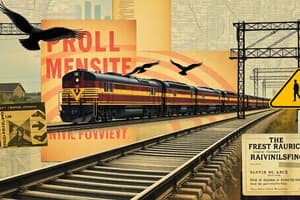Podcast
Questions and Answers
What was the Icc?
What was the Icc?
- An organization for farmers
- A Supreme Court case
- A federal regulatory board for transportation (correct)
- A political party
What are 'infant industries'?
What are 'infant industries'?
Industries that are young and developing, protected by high tariffs.
Who was William Marcy Tweed?
Who was William Marcy Tweed?
A political boss in NYC who stole more than $200 million from the public.
The spoils system allowed men to buy their way into office.
The spoils system allowed men to buy their way into office.
What were Stalwarts?
What were Stalwarts?
Who were the Mugwumps?
Who were the Mugwumps?
What was the Pendleton Civil Service Reform Act?
What was the Pendleton Civil Service Reform Act?
What is the Populist movement?
What is the Populist movement?
What were the Granger Laws?
What were the Granger Laws?
What was the Munn v Illinois case about?
What was the Munn v Illinois case about?
What did the Wabash v Illinois decision establish?
What did the Wabash v Illinois decision establish?
What was the Farmers Alliance?
What was the Farmers Alliance?
What caused the Panic of 1873?
What caused the Panic of 1873?
What was the Great Uprising of 1877?
What was the Great Uprising of 1877?
Who was Henry George?
Who was Henry George?
What does WCTU stand for?
What does WCTU stand for?
What is NAWSA?
What is NAWSA?
Flashcards are hidden until you start studying
Study Notes
Federal Regulation and Economic Policies
- ICC (Interstate Commerce Commission): First federal regulatory board, aimed at supervising railroad regulation.
- "Infant Industries": Hamilton's strategy to protect developing industries through high tariffs on imports.
- Pendleton Civil Service Reform Act (1883): Introduced merit-based system for federal jobs, establishing the Civil Service Commission; initially applied to 10% of federal positions.
Political Figures and Movements
- William Marcy Tweed: NYC political boss who embezzled over $200 million; indicted in 1871 and sentenced to prison.
- Stalwarts: Faction of the Republican Party led by Roscoe Conkling, supportive of machine politics and patronage.
- Mugwumps: Republicans who switched to support Democrat Grover Cleveland in the 1884 election due to moral opposition against their own candidate, James Blaine.
Labor and Economic Reforms
- Populist Movement (1892): Formed by the Farmer's Alliance; aimed at appealing to workers with proposals for government intervention, progressive taxation, and direct democracy.
- Granger Laws: Enacted by the Grange to regulate railway rates and storage fees, though ultimately reversed.
- Munn v. Illinois (1877): Supreme Court case affirming state regulation of commerce within borders, particularly for railroads; largely overturned by Wabash v. Illinois.
Economic Crises and Strikes
- Panic of 1873: Economic downturn due to over-expansion in railroads and factories along with excessive bank lending; key causes included over-speculation and surplus credit.
- Great Uprising of 1877: The first nationwide work stoppage in U.S. history, highlighted the labor unrest following wage cuts and federal troop intervention against strikers.
Social Reform Movements
- Henry George: Proposed social reform through a "single tax" on land to address inequality and economic disparities.
- WCTU (Women's Christian Temperance Union): Founded by Frances Willard to mobilize women against alcohol; aimed at becoming a political force but had limited success.
- NAWSA (National American Woman Suffrage Association): Formed in 1890 to unify women's suffrage efforts; a collaboration of NWSA and AWSA, functioning as a parent organization for various local groups.
Studying That Suits You
Use AI to generate personalized quizzes and flashcards to suit your learning preferences.




